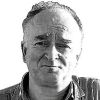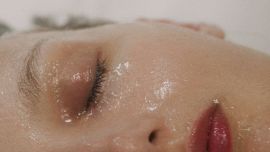Andrew Graham-Yooll was a known force by the time I arrived at Eland. I had looked him up in the office files before my first meeting and was suitably impressed by his British journalistic career, let alone his heroic status in Argentina. Here was a man who could work at both The Daily Telegraph and its chief political antagonist, The Guardian, giving them both up to work on something really worthwhile, creating South magazine from The Third World Review, followed by editing Index on Censorship, which was really working on the side of the Angels.
But what I was not prepared for was the presence of the man, his affability, his physical ease, his twinkling humour and his ability to puncture pomposity without ever weakening his enormous commitment and delight in work.
He was, despite the camouflage of all those Scottish names and this London Fleet Street career, clearly a South American male. He was not interested in contracts, systems or office hours, but accepted the dictats of a deadline and a mission with absolute conviction. I share some of this approach to life, and on one occasion Andrew wondered if he should have something in writing from me. I told him that all I could offer him was my word. I was met with a close, measured stare. The offer was accepted with a handshake worth more than any paper.
At that time in his life he looked like Hemingway. At his steel-grey-bearded, expatriate best, he was full of a commitment to drink man to man (which meant bottles of Argentine Malbec) to delight in life, to plot books and future projects, to open his eyes at the delight of being able to fall in love with another woman without in anyway betraying his continual lifelong commitment to his family of children. Indeed I remember him reporting his daughter’s opinion, “that’s going it, Dad” – as a form of inner moral compass when he had been sailing a bit close to the wind.
It was also clear that he approved of Eland. On another evening, at another bar, I heard of his affectionate regard for my predecessor. How John Hatt had got hold of his Portrait of an Exile, which had been published by the short-lived Junction Books in 1981. How an early reading by Nicholas Shakespeare had backed up John Hatt’s conviction that this was indeed something of enduring worth. Then the task of pulling together the rights, which Andrew had given to an affable US publisher (Lawrence Hill), who seemed to have never quite got round to paying royalties as well as a partial commitment to another London house. Then a completely fresh edit with a brand new chapter added, before the world got to read A State of Fear: Memories of Argentina’s Nightmare. It is his masterwork.
A similar erratic journey brought Goodbye Buenos Aires to Eland, which had first been published in Spanish in 1997, then a translation two years later by John Lucas’s Shoestring Press in Nottingham. John Lucas was a man after Andrew’s heart – a poet, a professor, a jazz musician and a publisher. By happy coincidence, he was also a travel writer and an Eland author, so the negotiations were easy. In this case, I failed to persuade Andrew to turn up the emotional heat and create a misery memoir for the Eland edition. It became clear that this book had a purpose. It was an explanation of his father’s life, a chronicle of the creolization of a Scottish immigrant.
In the process I got to hear about Andrew’s childhood. The death, when he was aged six, of his adored mother, who was replaced by a vicious stepmother who beat him and his sister while his father disintegrated into an alcoholic. How he was first arrested aged 10 trying to derail a train: his escape from home and his incarceration in a borstal, from which he was fortunately rescued by a maternal uncle, aged only 13. How he had delighted in the comparative ease of his formal schooling, the regular meals and games, but never passed a single exam in either of his two schools. Andrew was an entirely self-taught and self-determining man. No wonder his eyes sparkled as they did. The laurels of his highly literate career had not slid onto his head as a result of a well-oiled progression of tutors, academies and universities. All had been fought for. Fought for and won.
Looking back through our correspondence, I came across this letter to the office from Andrew, which brims over with the spirit of the man:
“Happy New Year to all of you at Eland. We are reading about tough Winter weather on your side of the ocean.
“Today my day outside ended in the tiny canvas pool which we have installed in the sort of shade under the wild mulberry, the equally wild medlar and the horrific Acacia Negra – with huge thorns. People say the Guaraní of Paraguay used the thorns as needles for sewing. The seeds have come down the River Uruguay with successive flooding and grow all along the Banks. We have to destroy about 10 or 12 large trees of this species, which previous owners allowed to grow as it makes impenetrable fences, the trunk full of thorns. The Wood burns well. Some years ago I ran a thorn through my hand, right through, and my hand swelled up. It shocked Adriana, I was just very sore because the thorn caused an allergic effect. Should have explained, I am in Pueblo Liebig, Entre Ríos , about 360 kms north of Buenos Aires. About 700 population. Adriana has finally bought a house here after 15 years of renting.
“Anyway, I was in the little pool there, cooling down after stripping paint off one of the doors. I’m trying to help Adriana as much as I can to get the “new” house in order. The radio said about 35ºC, but who knows if that applies here. The water in the pool, and in the taps and in the shower is pumped straight from the River Uruguay. We use it for tea, for coffee, for washing. I prefer to boil it for drinking straight, so the mud settles a bit and then you don’t taste the mud so much.
“Until early December we had lovely fireflies in a sort of mini-wetland near the house, they lit up the night, but with the drought they’ve gone, or the owls have eaten them. Each morning now I watch about six tero-teros come across the dirt road in front and walk into the “garden” and settle in the shade for the day. They must be hatching nearby, but they just stay in the shade outside the house, are not even bothered by our comings and goings. They probably used to come for the water and the insects around there, but the heat now is such that we don’t even have many mosquitoes or flies. There is a breeze sometimes, and the tero-tero open their wings and ruffle their feathers trying to cool off. They used to be joined by a family of four wild hens, whatever they’re called, but the hens have gone. I loved watching the hens walk almost regally across the mowed grass in the morning, looking for nibbles in the cut grass.
“Now the grass is yellow, and walking on it is a bit like treading on dry biscuits, crunch, crunch!!! In a way it suits me because the electric mowing machine broke down and is now with the mechanic in Colón (10 kms away), so even if the machine was here I would hardly use it. We went to Colón last night for my birthday supper. Lovely supper: a kind of lukewarm salad of pieces of roasted Dorado (covered with sesame seeds), mixed in with aubergine, sweet potato and several other veggies.
“There are no big lizards in the garden. There is a gathering of small ones, about 20cms, but not the big metre-long ones we had in the other house. I love the heat. The dust is a bit of a nuisance. We took the bus into Colón for my 70th birthday supper (Sunday). When we got off the bus we jumped a bit and stamped our feet to shake off the dust from the road. Anyway, that is the story of Day 1 of my 71st year. I have to finish work on an interview with the priest in the Villa 21 slum near home in Barracas. Very pleasant man though too busy. I knew his father, who was one of the La Nación leader writers. And then write a couple more articles. PERFIL newspaper on Sunday gave me nearly two pages (two articles, about my poetry and about my translations of British poets).
“Just thought you might like to know.”
We did, Andrew.
























Comments